Rye Barcott's Blog, page 8
September 12, 2019
Community Development is a Way of Life
Community development, and our focus on girl’s empowerment, is an act that takes daily practice which is strengthened by continual critique, analysis, and optimism.
The brisk winter air skims my face as I leave for work from the warmth of morning chai with my host family. My morning commute takes me through a tunnel of shop owners opening business for the day, charcoal and vegetable stands, and eventually through Kibera Drive, which leads me directly to Carolina for Kibera in Olympic Estate. I pass the same businesses later in the afternoon, and with a warm setting sun, we are much more likely to greet each other with a simple “Sasa” or “Habari yako?” through the crowded streets of zooming matatus and school kids in uniforms.

As a Peacock Fellow, I supported the Binti Pamoja | Daughters United Core program, which is part of the girls’ empowerment program at CFK. My focus has been to develop a five-day training program for the Girl’s Parliament, which will involve twenty-four teenage mothers from all districts of Kibera on building their own advocacy project. Each girl is democratically elected and responsible for representing their position, perhaps focusing on a certain topic like environmental awareness, girls’ wellbeing, or community security. Some of these girls are mentored by young women who will be part of a story-telling and photography project to raise awareness about their own importance in Kibera’s development and lives of their mentees.

Girls gather together for a life skills program facilitated by a mentor with the Binti Pamoja program.
Through the length of my fellowship with CFK, the deep commitment of our work in the community allowed me to see the true purpose of it; belonging to a community and acting on the opportunity for change. The Binti Pamoja staff has granted me the ability to be creative and artistic with the changes they hope to see for their community,and has certainly embraced me as part of their team. During our time together, they brought me to attend safe space meetings for teenage mothers, teacher conferences, radio talk shows, and discussions with mentors and mentees in different districts in Kibera. We discussed with great detail and analysis the strength of change for young girls to envision themselves as change makers, using knowledge about sexual and gender based violence to create safer environments, and the strong community environment in Kibera.
The wider team at CFK made the office a collaborative and entertaining environment, but also one that deeply cares about the wellbeing of each individual. We bonded specifically over a team-building day in Lukenya, and playing soccer together so roughly that the grass stains in my jeans will always be a reminder of how many times I fell down and was equally supported to get back up.
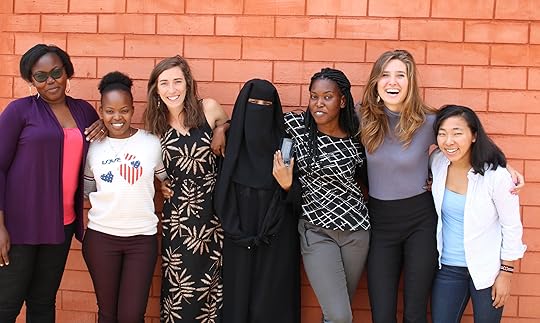
Anna with other interns and Peacock Fellows outside the Binti Pamoja Center, Summer 2018.
I believe the strength of the community in Kibera comes from “sleeping with another’s burden as your own,” as Lilian, a mentor to me on the Binti Pamoja team mentioned. With selfless effort and empowerment, the Binti Pamoja team has shown me who should decide the direction for their community, and that community development is a way of life. Community development, and our focus on girl’s empowerment, is an act that takes daily practice which is strengthened by continual critique, analysis, and optimism.
The post Community Development is a Way of Life appeared first on Carolina for Kibera.
September 4, 2019
To Enjoy the Pursuit of the Dream
Velma, now 24, lost her mother ten years ago. She grew up parentless with her four brothers under the care of her grandmother. As she reflected on her childhood Velma recalled being unable to afford basic necessities. “We often went without food, lack of school fees, sometimes [were] in and out [of] school due to arrears. Life was very difficult” – Velma
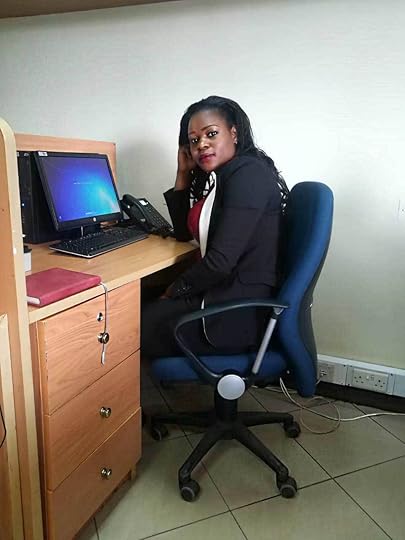
Velma, now 24, lost her mother ten years ago. She grew up parentless with her four brothers under the care of her grandmother. As she reflected on her childhood Velma recalled being unable to afford basic necessities.
“We often went without food, lack of school fees, sometimes [were] in and out [of] school due to arrears. Life was very difficult” – Velma
Following her mother’s death, Velma finished out her high school years living with her grandmother and step-mother. In 2013 she graduated from high school and moved to Nairobi to live with her Aunt, hoping to go back to school or find meaningful employment. She became pregnant less than a year later. Her aunt was unable to provide for her already, there was no way she could afford another child. Velma now had an even greater weight on her chest – she was pregnant with no help from family, no job, and no perceivable chance at obtaining a college degree.
Fast forward to 2019 when Velma came to Kibera with a friend. “I asked her if she could find me a job, and her reply was ‘there is an organization that supports youth to go to college [and] vocational trainings.’” Velma was intrigued and began exploring ways to get involved with CFK. She was desperate for chance at a fresh start.
“We went to one of CFK’s community health volunteers who introduced me to CFK and the rest is history.”
Full of determination and intrigue, Velma dove into the world of CFK with few inhibitions. She opted to begin a series of trainings focused on life and employability skills, and financial literacy training. CFK offers a variety of work training programs based on the interests of those in the program. Velma was afforded the opportunity to work with Generation Initiative Kenya, one of CFK’s partners, to take a financial and sales service course.
After completion of the course, Velma was offered an apprenticeship with ICEA Lion, a local insurance agency. After only two weeks she was offered to interview for a sales agent position. “I knew this was my opportunity, this was my window.” Not surprisingly, she aced the interview and was offered a full-time position.
Velma, a young woman who began her journey with CFK as a single mother with little family support and no career, feels that she is “finally on the path [she has] always wanted.” When we talked to Velma we asked her what the ingredients were to her successful transition into a fulfilling career. Her response was simple, but inspirational, “If you dream it you can achieve it; the only secret to recapture our dream is to enjoy the pursuit of the dream…”
The post To Enjoy the Pursuit of the Dream appeared first on Carolina for Kibera.
April 25, 2018
Help #DefeatMalaria For Good!
By Brooke Bauman, Communications Intern
Today, April 25th is recognized around the globe as World Malaria Day, dedicated to “End Malaria For Good.” According to the event’s website, 400,000 people are killed annually by this preventable and curable disease. The World Health Organization (WHO) cites that the WHO Africa region, including Kenya, accounted for 90 percent of malaria deaths in 2016.
Kiberans are highly vulnerable to contracting this disease, especially in the community where piles of wet trash and stagnant waste water is a perfect breeding ground for mosquitoes. The WHO notes that people may acquire symptoms about 10-15 days after the initial bite. These minor symptoms may be difficult to identify but if the patient is not treated within a day, the disease will quickly escalate to a severe case.
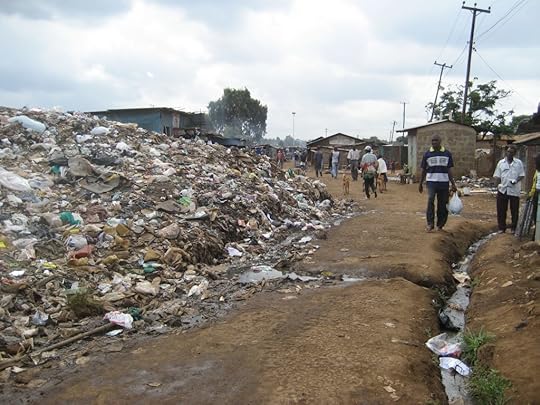
When people are infected with severe cases of malaria, it is essential to receive treatment as soon as possible before the disease develops further. For Kiberans who put their hearts and souls into their occupations, a major illness like malaria can be devastating. It can pull them away from their jobs and families and affect their ability to adequately perform daily tasks.
Ultimately, the good news is that malaria can be prevented through various methods ranging from insecticide-treated mosquito nets and indoor residual spraying to drugs. However, it is essential for Kiberans and other vulnerable populations to receive proper medical attention so that early symptoms can be identified and preventative measures can be taken.

At CFK, we are dedicated to promoting the health and well-being of all Kiberans. The Tabitha Medical Clinic has partnered with the U.S. Center for Disease Control and Prevention to administer health services for little to no cost and Community Health Volunteers work within communities to bring people to the clinic.
Help #DefeatMalaria! Your donation will help provide adequate preventative products and treatment to Kiberans. Donate today!
March 26, 2018
Panel Event – Empowering Africa: Women in Leadership
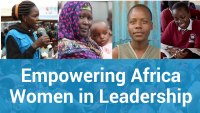 Thursday, April 5th
Thursday, April 5th
6:00 – 7:00 pm
Pleasants Family Room
Wilson Library @ UNC
Across Africa, women and girls are more likely to face some of the world’s most urgent challenges which can often prevent them from fulfilling their potential. Within informal settlements and urban slums like Kibera in Narobi, Kenya, adolescent girls are especially marginalized and more vulnerable than boys.
Focused on finding solutions for marginalized populations, four leading African women from Kenya will bring light to the biggest issues facing girls and women today across Africa: access to education, economic opportunity, water and sanitation, reproductive health and rights, maternal and child health, child marriage, female genital mutilation, gender-based violence, and gender equality. Panelists include (click here for panelist bios):
Dr. Anne Khasakhala, Senior Lecturer and Director of Population Studies and Research Institute at the University of Nairobi;
Christine Ng’ang’a, Managing Director at Strategia Advisors Limited;
Mercy Owuor , Head of Research, Development & Policy at CFK and recently named a 2017 Heroine of Health by GE Healthcare; and
Shirley Owino, Program Associate with Ipas.
Dr. Anu Kumar, Interim CEO at Ipas, will moderate the panel.
Event Co-Sponsors: Carolina for Kibera and The University of North Carolina Institute of Politics
Supporting Sponsors: Duke-UNC Rotary Peace Center, UNC Center for Global Initiatives, Ipas, Department of Political Science at UNC-Chapel Hill,Global Social Development Innovations, The University of North Carolina at Chapel Hill Curriculum in Peace, War & Defense.
March 21, 2018
Ensuring Access to Clean Drinking Water
Despite water being the most abundant resource on the planet, it is estimated 1.8 billion people drink from unsafe or insufficient water sources. The number reflects almost all the residents of Kibera who drink from insufficient or tainted water sources. Subsequently, the United Nation’s sixth Sustainable Development Goal (SDG) is to ensure all people have access to clean drinking water by 2030.

March 22nd is World Water Day – a day to raise awareness and take action on the most important resource we have. This year, we are bringing to light 5 reasons why we must strive for universal and equitable access to water, sanitation and hygiene for all.
1. Water is difficult to access. Few residents of Kibera have piped water in their home. They have to walk fair distances to collect water at community taps (often these do not work) or have to find a truck that brings water in.
2. Finding water is time consuming. It’s an arduous process to find water, fill it in heavy jerry cans, and walk it back to one’s residence. This can impact the ability for residents in Kibera to search for work, and often times a chore for older children.
3. Water is expensive. Water is often the biggest household expense for Kibera’s over 200,000 residents. Most earn less than $1.25 (113 Kenyan shillings) a day and spend up to one third of this on water.
4. Water is dirty. The water that is collected in Kibera is often contaminated. Residents must purify their water before using it. There are many methods of water purification but the most common is to use nontoxic chemical based solutions that are given out free of charge or at a low cost by NGOs.
5. Poor water systems = poor health. (especially for pregnancy mothers and young children) Without proper water management, water-borne infectious diseases spread more easily. In the developed world water is used to dispose of human waste but that is not in the case in Kibera. Because they lack piped water and sewage services, most residents use communal toilets or defecate in a bag and throw it (known as flying toilets). The toilets commonly overflow, leading leads to massive hygiene problems and contributes to the spread of disease.
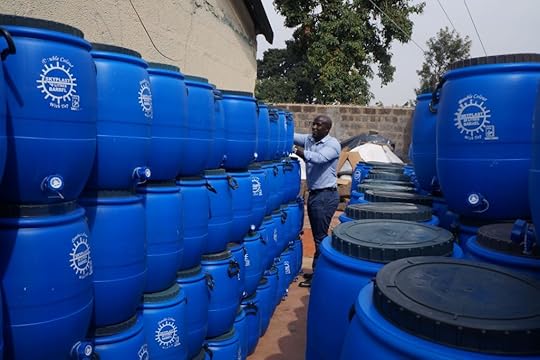
We are committed to alleviate the effects of poor water, sanitation and hygiene (WASH) systems to improve health and decrease the spread of disease. Our community wellness initiative including household trainings on water management and how to properly use water purifying systems. We also work to integrate WASH trainings with youth in our sports, education, and Binti Pamoja programs to help raise awareness of contaminated water sources and proper alternatives.
On World Water Day, help ensure clean and ready access to water for all residents in Kibera. Donate today!
March 13, 2018
CFK’s Mercy Owuor speaks at UN Headquarters in New York
Mercy Owuor, the Head of Research, Policy and Development at CFK, was invited to serve as a panelist and speaker at the 62nd Commission on the Status of Women event session at UN Headquarters in New York, NY. This was a joint event of the World Health Organization, International Labour Organization, The Permanent Mission of Ireland to the United Nations and Women in Global Health. Below is an excerpt of her address.
“Let us not leave anyone behind; join us in ensuring that all rural women and girls are empowered.”
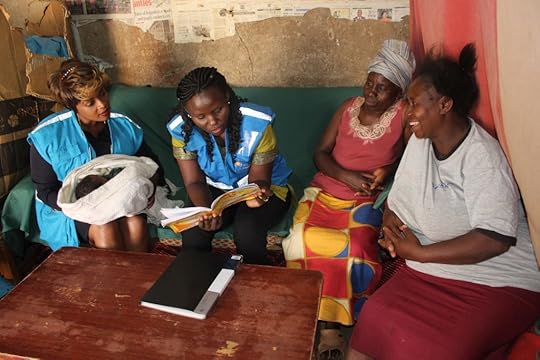
When I was growing up, my dream was to work with women and children, I often dreamt about having children and seeing them grow to fulfill their purpose in life. The organizations I have worked with provided me with the opportunity to work closely with women. Most recently, my work was based in a rural community that required I drive two and half hours every Friday in order to spend time with my family and two children ages four and seven. I will admit it has not been easy but I am grateful for my experiences and this hard work.
My first role was mentoring a group of young women. One day as I was having a session, I noticed one of the women was missing from the group. I asked the group where Mary was and there was a long awkward silence. Finally, one brave member shared that Mary had lost her son. This shocked me and so many questions ran through my mind. I wondered why no one told me about it or even asked for my help.
One woman stood up and shared that in their community, they do not announce when a child dies. Usually, only the close relatives will know. Although I was from the same Luo tribe as these women and had grown up nearby, I had never heard of this tradition. When I asked why this was practiced they replied, “Too many children die in this village. If we eulogized them all, it would simply be too much.”
This shocked me, and I was left thinking, “How many children have we lost who were never counted? How many more are we going to lose if we don’t act now?”

At this moment, everything changed for me. I launched a community health outreach program, which deployed a team of former traditional birth attendants to act as community health workers, identifying all pregnant women in the community and linking them to care. I am pleased to share that Mary enrolled in the program and now has two healthy children.
The community health workers are providing education and support to women and children. From the program, we managed to reduce the mortality of children under the age of five by half the county average, increased skilled delivery from a previous average of 26% to 97%, and increased uptake of contraceptives by 300%. Now, over one million people in Migori County, Kenya, are being impacted by this program.
Three-quarters of the community health workers are women with 40% of those being reformed traditional birth attendants. The program has provided employment to many women from the community, and girls from this community now see hope for a better future and a reason to go to school. They have broken long standing traditional and cultural biases that increased women’s marginalization and vulnerability to become beacons of hope to the challenge of access to quality and affordable healthcare in rural communities.
It is challenging for women leaders, perhaps especially in Africa, to balance the demands of their careers and those of their families. In Kenya, there are heavy cultural expectations of women to be the central force of childcare and social engagement for the family. This is difficult to square with the long hours and personal sacrifices it takes to lead healthcare enterprises.
However, my push came from the knowledge that a pregnant mother deserves to receive education and support to know the benefits of having skilled delivery, immunizations for their children and family planning; girls need to enroll and complete school to pursue their dreams and purpose in life; and that all children can celebrate their fifth birthday. That is what the world should look like.
More about Mercy:
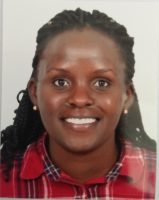 A Heroine of Health 2017 Awardee from GE Healthcare and Women in Global Health, Mercy is a community Health and Development specialist with over 10 years of program management and research experience working with communities to improve their health outcomes. Her interests are in various public health and social science disciplines including maternal and child health, reproductive health, HIV/AIDS and poverty. She is one of four global health leaders featured in the 2017 Heroines of Health Documentary by GE Healthcare. Prior to her work at CFK, Mercy served as the Director of Community Programs at Lwala Community Alliance where she lead efforts to improve maternal and child health outcomes working closely with a team of community health workers in rural Kenya. She also served as a Field Study Coordinator at the University of Nairobi College of Health Sciences. Mercy holds an Master of Science in Community Health and Development from Great Lakes University, and a Bachelor of Arts in Sociology from Moi University.
A Heroine of Health 2017 Awardee from GE Healthcare and Women in Global Health, Mercy is a community Health and Development specialist with over 10 years of program management and research experience working with communities to improve their health outcomes. Her interests are in various public health and social science disciplines including maternal and child health, reproductive health, HIV/AIDS and poverty. She is one of four global health leaders featured in the 2017 Heroines of Health Documentary by GE Healthcare. Prior to her work at CFK, Mercy served as the Director of Community Programs at Lwala Community Alliance where she lead efforts to improve maternal and child health outcomes working closely with a team of community health workers in rural Kenya. She also served as a Field Study Coordinator at the University of Nairobi College of Health Sciences. Mercy holds an Master of Science in Community Health and Development from Great Lakes University, and a Bachelor of Arts in Sociology from Moi University.
March 8, 2018
#PressForProgress this International Women’s Day
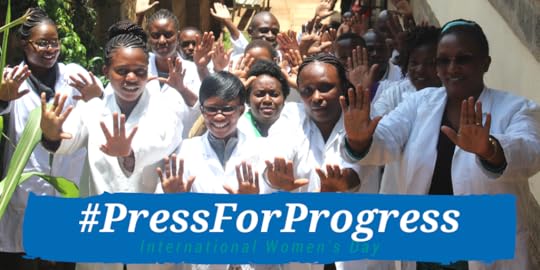
Women and girls living in Kibera continue to face tremendous barriers to success. They are disproportionately affected by violence and discrimination, and struggle to meet their basic needs amidst extreme poverty. Gender inequality, limited access to education, and lack of quality healthcare further impede progress.
This International Women’s Day, we are launching our #PressForProgress campaign.
Our team at Tabitha Medical Clinic has seen firsthand that investing in maternal and child health increases economic opportunity. They #PressForProgress because that believe all women deserve high-quality, affordable healthcare.
Over the next week, we will be sharing the many reasons our staff press for progress for women and girls in Kibera. Be sure to follow along on Facebook, Twitter and Instagram.
We hope that the stories of our staff will inspire you to give. Your donation fuels our work to connect women in poverty to the knowledge, opportunities, and access to healthcare they deserve and need to thrive.
DONATE TODAY and #PressForProgress. Be a catalyst for change.
February 26, 2018
Celebrate, Commemorate & Collaborate 4 #WorldNGO Day
Throughout history, non-governmental organizations have played key roles in supporting people and advocating for worthwhile causes. Today, we celebrate NGOs everywhere by recognizing February 27 as World NGO Day. Recently established in 2014 by the United Nations, this day of celebration acknowledges the crucial work of NGOs, whether at a local or an international level.
Here at CFK, our mission as a NGO to develop local leaders, catalyze positive change, and alleviate poverty in the Kibera slum of Nairobi is best explained through our main initiatives: Health, Youth, Sports, and Thrive. While these initiatives are interconnected, each category has a distinctive purpose that contributes to our overarching mission to empower Kiberans.

HEALTH
Access to affordable, reliable health care is hard to come by in Kibera. CFK is dedicated to changing this reality by offering holistic and comprehensive medical services through the Tabitha Medical Clinic and the Lishe Bora Mtaani Nutrition Center. Outside of the clinics, community volunteers offer personalized healthcare services that promote community wellness and reproductive health practices.

YOUTH
In Kibera, young girls are especially susceptible to face early marriage, female genital mutilation, inadequate education opportunities, and sexual violence. Recognizing that the future of Kibera lies in the hands of upcoming generation of leaders and entrepreneurs, CFK has focused on developing programs for young people, particularly girls. CFK aims to create a safe space for girls to express themselves through the Binti Pamoja [Daughter’s United] Core Program.
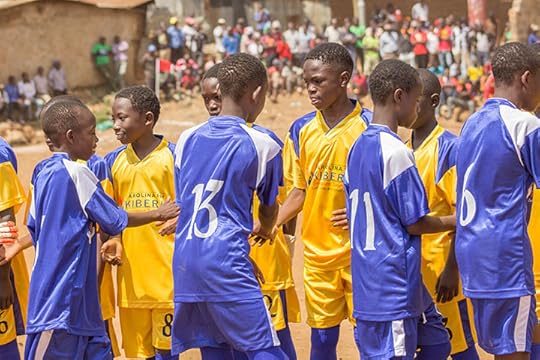
SPORTS
In Kibera, ethnic groups with distinct and sometimes conflicting cultural beliefs reside within close quarters. Unfortunately, misunderstandings can quickly escalate and create divides based on stereotypes. To bridge gaps between ethnic groups, we encourage ethnic groups to unite through sports. CFK’s soccer programs teach individual and team leadership supporting youth to prepare for the modern workplace where the expectation is to work collaboratively with people of all backgrounds.
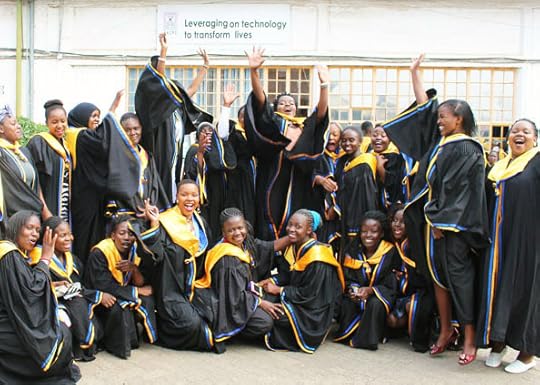
THRIVE
In Kenya, the unemployment rates is 40 percent but this statistic is much higher in Kibera. Many to turn to informal work, where profits are low and the work is both risky and irregular. CFK invests in initiatives like our Work Readiness program and our ICT initiative for girls to provide mentorship for youth seeking permanent, full-time employment outside of Kibera, while developing their technical and leadership skills.
To invest in young leaders, consider supporting our initiatives of Health, Sports, Youth, and Thrive by donating to CFK today.
February 23, 2018
A Fellow’s Reflections on Kibera
Last fall, 2017 James and Florence Peacock Fellow Jeff Walker, spent eight weeks with our nutrition and community wellness team on the ground in Kibera. As a graduate student at the UNC Gillings School of Public Health, Jeff was very interested to experiences his academic work in practice with the community. Keep reading to hear Jeff share more about his experiences in Kibera and what made the most impact on him during his time with CFK.
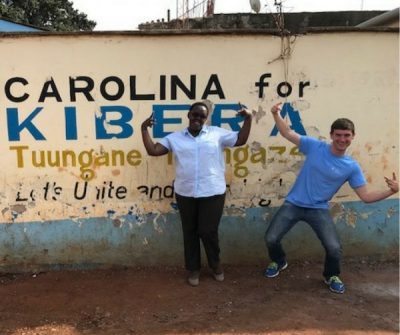
In your own works, what is Kibera?
Kibera is a hustling, bustling community of hard-working people and friendly families who live in a slum so they can seek out the opportunities available in Nairobi.
How did your perception of Kibera differ from your expectation going in?
I have been in slums and informal settlements before and thought I was prepared. However, Kibera is just so massive and dense that the living conditions were harsher than I expected. The lack of sanitation facilities and working with malnourished children left no doubt about the poor quality of life. On the flip-side I was impressed by the entrepreneurship and hard work of people in Kibera – I even met a man from another informal settlement in Nairobi who came to Kibera Town Centre to people watch because of all the famous musicians, politicians, and business people he heard had lived there before they became famous.
During your visit, what did your typical day look like?
A typical day for me started with some exercise – occasionally a run with a co-worker, eating breakfast, and then walking twenty minutes to CFK’s main office. From there I usually caught up with everyone, used the internet to respond to emails and read articles about malnutrition and early child development, and looked forward to mid-morning chai tea! Then I would either go with my preceptor Esther to Lishe Bora Mtaani, where we would measure and weigh kids, or we would go to an event in the community focused on nutrition. Usually, I would interview one or two people or conduct a focus group two or three days out of the week for the nutritional case study I was working on.
At the end of the work day I would typically walk back to my homestay and chat with my host mom so I could ask questions about what I had heard and process some of the cultural things I didn’t understand. After that we’d sit down to dinner in the living room and watch the English news broadcast, which prompted conversations about politics every evening. No matter what happened each day I did a lot of walking, which was a great way to get familiar with the community!
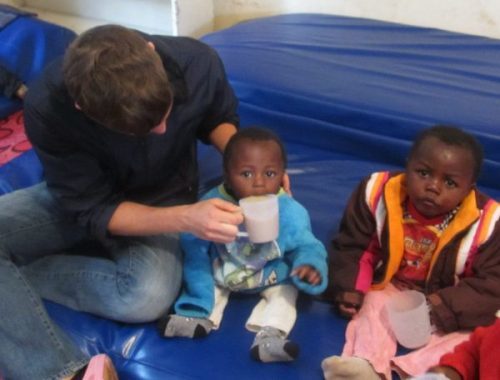
Which program did left the most of an impact on you?
The program that resonated with me most was Lishe Bora and the other malnutrition treatment and prevention programs at Tabitha Medical Clinic and in the Community Wellness initiative. Since I just finished my studies in public health and nutrition, these programs let me see a lot of what I learned at UNC in practice. I think the biggest aspect of these programs that I appreciated was the level of integration between CFK and the community. The number of community health volunteers involved in promoting breastfeeding, screening for malnutrition, and helping families in other ways was staggering and inspiring.
Pick a powerful moment from your visit. Why does this moment stand out to you?
As part of my work with Lishe Bora, I wanted to learn more about why people in Kibera choose to eat the foods that they do. When one of the Community Health Volunteers I worked with offered to take me on a few home visits so that I could see conditions there and ask questions about the foods people purchased and ate I was ready to go. In total, I visited six homes and each visit was powerful because most were with single parent families of children enrolled at Lishe Bora.
On the first home visit I met Gladys. The biggest struggles she faced included finding a stable job to pay rent, school fees, and buy food. I found this to be typical – mothers I spoke to often discussed cleaning houses when the work was available and skipping meals to feed their children while staying in budget. Most families also only ate corn or potatoes with greens, which was concerning due to the lack of protein. I also got acquainted with the fact that people in Kibera usually live in one or two room structures. Gladys used sheets to divide her room in half, one half for sleeping a family of five and the other half as a living and cooking space. I also noticed there was no water hose in Gladys’ home, all their water had to be purchased and carried to the house. Though I’d walked through slums before, it was more touching hearing Gladys speak about her family’s obstacles in her home. And the fact these discussions were repeated at each home visit was frustrating.
What was one thing you wish you would’ve known about Kibera before you had taken this position? Asked another way, what do you hope to communicate to people in the US about Kibera and Kiberans that might cause a shift in someone’s perspective?
I wish someone had told me Kibera was like New York City. It seems like an odd comparison at first. The living conditions in Kibera are much worse and families often struggle to buy enough food for their families while keeping the light on. But, I think the mindset of a lot of people is similar.
Over half of the people living in Nairobi live in slums and they choose to do that because jobs and educational opportunities are nearby. In most cases, the people I spoke to in Kibera had ties, family, and some even had land in rural Kenya. However, they brave tough living conditions because they decided to chase opportunities in Nairobi. While I was there I met business owners, activists, college graduates, footballers, teachers, and many people working to join the middle class. Kibera is like any place full of motivated people, there are struggles but tremendous potential as well. It was humbling and exciting to see how CFK is building Kibera up to be a healthier, safer, and stronger community while also connecting individuals to opportunities for success.
Jeff, from the team at CFK, thanks so much for your time, commitment and work in the community of Kibera and with CFK. Congrats on completing graduate school and becoming certified as a registered dietitian. Good luck and come back and see us next time you’re in Kenya!
CFK Board Member Selected for 2018 New Voices Fellowship
 The following excerpt was originally posted January, 23, 2018 on The Aspen Institute’s website.
The following excerpt was originally posted January, 23, 2018 on The Aspen Institute’s website.
Board Member, Dr. Stellah Bosire, has been selected for the New Voices Fellowship, Aspen Institutes’s groundbreaking program designed to ensure experts from the developing world have a voice in the global development discussion. Dr. Bosire is joined by experts in infectious diseases, community-led development, human rights, health and vaccinations, and environmental conservation. Supported by the Bill & Melinda Gates Foundation and the Open Societies Foundation, the New Voices Fellowship was established in 2013 to bring the essential perspectives of development experts from Africa and other parts of the developing world into the global development conversation.
“Across the world, local experts and local communities are taking charge of their own futures,” said New Voices Fellowship Director Andrew Quinn. “These are the voices we should be listening for when we listen to the story of global development – because these are the voices that show the way forward on humanity’s greatest challenges, including infectious disease, food security, good governance and climate change.”
Born and raised in Kibera, the largest slum in Africa, Dr. Stellah Bosire has lived in a community that was marginalized both socially and economically. Stellah is a Global/Public Health specialist and also has extensive experience managing healthcare businesses. She currently serves as an Executive Officer in the Doctors Professional Association of Kenya and is the Vice Chairman- HIV/AIDS Tribunal of Kenya. In addition to serving on the Board of Trustees for CFK, she also serves on the National Gay Lesbian Human Rights Commission of Kenya. Stellah will soon graduate with a post-graduate Masters in Business Management as she finalizes another post graduate study in Global Health Policy. She was named top 40 under 40 Influential Women in Kenya in 2017.
The 20 new Fellows are leading public health specialists, doctors, scientists, activists, social entrepreneurs, policy experts, researchers, and economists, and come from 12 countries across Africa, Latin America, and Asia. The full list of 2018 fellows and descriptions of their work can be found below.To meet the other fellows and read the full media release, click here.
For more about the New Voices Fellowship, visit www.aspennewvoices.org. Follow all the fellows on Twitter here and the Fellowship at @aspennewvoices.
Rye Barcott's Blog
- Rye Barcott's profile
- 7 followers



